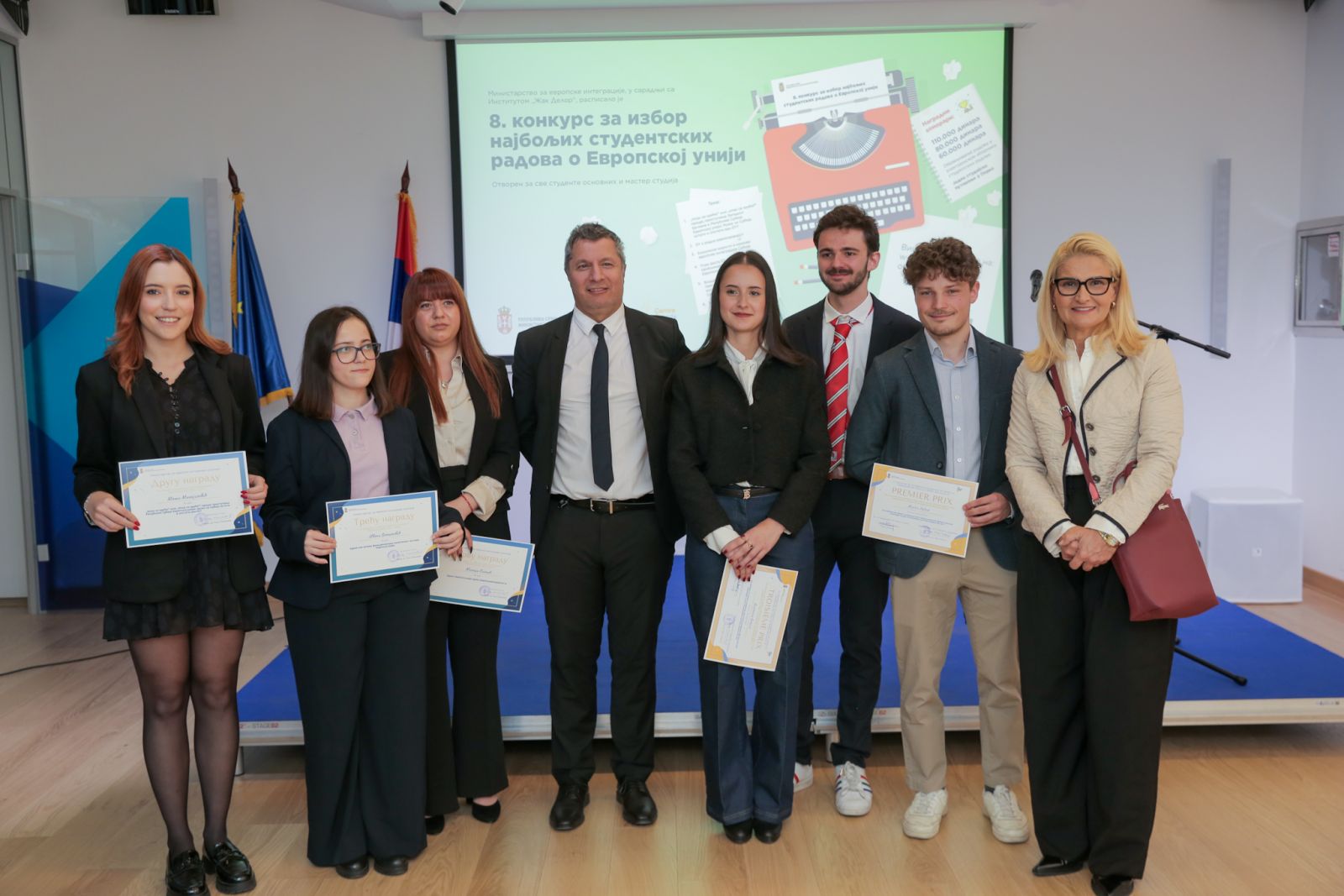
“It is important for students to reflect on Europe, to be critical, and to find arguments that can help Serbia on its European path,” stated Minister of European Integration Tanja Miščević today during the awarding of prizes to Serbian and French students for the best papers on the European Union.
The Ministry of European Integration launched the eighth competition for the best student papers on the EU for students in the Republic of Serbia and in collaboration with the French Institute in Serbia, the University of Bordeaux, the Jacques Delors Institute, and the House of Europe in Aquitaine, a competition was also organised for students from French universities on the relationship between France, the European Union, and the Western Balkans.
Three students from Serbia and three from France were awarded. The prizes for Serbian students were RSD 110,000 for first place, RSD 80,000 for second, and RSD 60,000 for third place, along with the publication of their papers in an electronic collection of student papers by the Ministry of European Integration.
The competition topics included the EU accession process of the Western Balkans and Serbia, gender equality within the EU, the economic benefits and challenges of Serbia’s European integration, the EU Growth Plan as an opportunity for the Western Balkans to approximate to the EU, and the rule of law in light of the EU’s current negotiation methodology.
The first-place winners were Milica Ristić, a student at the Faculty of Diplomacy and Security, and Martin Pittet, a political science student from the University of Bordeaux.
Second place was awarded to Maša Mihailović, a student at the Faculty of Political Science (FPN), and Félix Sánchez, a political science student at the Cergy Paris University. Third place went to Ivana Vlašković from FPN and Anastasia Brković, a law student at the Paris Nanterre University.
Miščević emphasised that by organising such competitions, the Ministry seeks to understand how young people perceive the European integration process.
“The idea of the competition is for young people to shape their ideas to either confirm or refute the topics proposed by their professors,” Miščević explained, adding that various professors from the University of Belgrade had helped select and evaluate the 14 submitted papers.
She noted that some of the students had already interned at the Ministry, while others were interested in working there, highlighting that another benefit of the competition was identifying young people interested in the European integration process.
Deputy Head of the EU Delegation to Serbia Plamena Halacheva stated that the competition had demonstrated that gender equality was one of the topics that most interested young people and should be discussed more within the EU.
“Students show that women are at the heart of building a more inclusive, stronger, and resilient Europe,” Halacheva noted, stressing that such projects help create bridges between France and Serbia and encourage interest in Serbia’s European integration process in a key EU country like France.
Halacheva invited young people to take advantage of some of the many opportunities the EU offers, such as the Erasmus+ programme and the Young European Ambassadors initiative.
First Counsellor at the French Embassy Fatih Akcal stated that France was actively committed to supporting Serbia in its European integration process, a commitment confirmed by French President Emmanuel Macron’s visit to Serbia.
“We regularly have delegations coming to support Serbia because the EU needs a strong Serbia, just as Serbia needs a strong EU,” Akcal said.
He announced that said support would take a concrete form in the coming days and weeks when the progress report on Serbia was released.
Director of the French Institute Stanislas Pierret conveyed that the message conveyed by the competition – ”Together we are stronger” – was especially important at that moment in the context of the ongoing war in Ukraine.
Source: FoNet





























